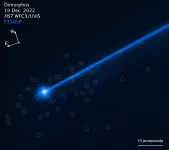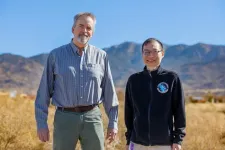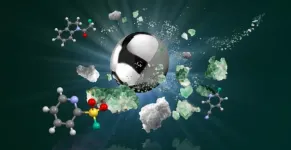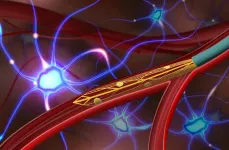(Press-News.org) How useful a memory is for future situations determines where it resides in the brain, according to a new theory proposed by researchers at HHMI"s Janelia Research Campus and collaborators at UCL.
The theory offers a new way of understanding systems consolidation, a process that transfers certain memories from the hippocampus – where they are initially stored – to the neocortex -- where they reside long term.
Under the classical view of systems consolidation, all memories move from the hippocampus to the neocortex over time. But this view doesn’t always hold up; research shows some memories permanently reside in the hippocampus and are never transferred to the neocortex.
In recent years, psychologists proposed theories to explain this more complicated view of systems consolidation, but no one has yet figured out mathematically what determines whether a memory stays in the hippocampus or whether it is consolidated in the neocortex.
Now, Janelia researchers are putting forward a new, quantitative view of systems consolidation to help resolve this longstanding problem, proposing a mathematical neural network theory in which memories consolidate to the neocortex only if they improve generalization.
Generalizations are constructed from the reliable and predictable components of memories, enabling us to apply them to other situations. We can generalize certain features of memories to help us understand the world, like the fact that canyons predict the presence of water.
This is different from episodic memories -- detailed recollections of the past that have unique features, like an individual memory we have of hiking to a particular canyon and coming upon a body of water.
Under this view, consolidation doesn’t copy memories from one area of the brain to another but rather creates a new memory that is a generalization of previous memories. The amount that a memory can be generalized – not its age -- determines whether it is consolidated or remains in the hippocampus.
The researchers used neural networks to show how the amount of consolidation varies based on how much of a memory is generalizable. They were able to reproduce previous experimental patterns that couldn’t be explained by the classical view of systems consolidation.
The next step is to test the theory with experiments to see if it can predict how much a memory will be consolidated. Another important direction will be to test the authors’ models of how the brain might distinguish between predictable and unpredictable components of memories to regulate consolidation. Uncovering how memory works can help researchers better understand an integral part of cognition, potentially benefitting human health and artificial intelligence.
END
New theory better explains how the brain stores memories
2023-07-20
ELSE PRESS RELEASES FROM THIS DATE:
Draining 401(k) accounts when changing jobs: the hidden time bomb undermining retirement savings
2023-07-20
Key Takeaways:
At job separation, 41.4% of employees cash out 401(k) savings, most draining their entire accounts.
Cashing out increases with the proportion of the 401(k) balance contributed by employers. The “account composition effect” is most likely driven by behavioral rather than economic explanations.
The cash-out option was presented to terminating employees in a salient way, unintentionally nudging them to withdraw their 401(k) savings.
BALTIMORE, MD, July 17, 2023 – When researchers set out to study 401(k) retirement savings ...
Hubble sees boulders escaping from asteroid dimorphos
2023-07-20
The popular 1954 rock song "Shake, Rattle and Roll," could be the theme music for the Hubble Space Telescope's latest discovery about what is happening to the asteroid Dimorphos in the aftermath of NASA's DART (Double Asteroid Redirection Test) experiment. DART intentionally impacted Dimorphos on September 26, 2022, slightly changing the trajectory of its orbit around the larger asteroid Didymos.
Astronomers using Hubble's extraordinary sensitivity have discovered a swarm of boulders that were possibly shaken off the asteroid when NASA deliberately slammed the half-ton DART impactor spacecraft into Dimorphos ...
The American Society for Nutrition appoints Xingen Lei, Ph as next editor-in-chief of The Journal of Nutrition
2023-07-20
Rockville, MD (July 20, 2023) Xingen Lei, PhD, professor of molecular nutrition and associate dean of research and innovation at Cornell University’s College of Agriculture and Life Sciences, has been named the next editor-in-chief of The Journal of Nutrition, effective January 1, 2024. Established in 1928, The Journal of Nutrition is the oldest journal devoted to publishing influential original research, reviews, and perspectives of molecular, cellular, animal, human, and population nutrition and mechanisms.
Dr. Lei has published extensively in The Journal of Nutrition ...
Sending the shoes back? How about this lovely gift card? Cross-selling can help retailers avoid lost revenue from returns
2023-07-20
https://www.rotman.utoronto.ca/Connect/MediaCentre/NewsReleases/20230720
Toronto - It’s become so darn easy to order stuff thanks to the miracles of online shopping. But it’s not so simple on the retailer end, especially when more than 16 per cent of those sales are later sent back. In the U.S., that adds up to a staggering $816 billion in lost revenue.
Cross-selling can help, say a pair of researchers. Their experiments show that once we’ve chosen to buy something, we tend to consider that money as already spent or gone, also called ...
ECOG-ACRIN adds a new treatment trial to the ComboMATCH precision medicine initiative
2023-07-20
The ECOG-ACRIN Cancer Research Group (ECOG-ACRIN) has enrolled the first patient in a new treatment trial to evaluate the effectiveness of adding nilotinib to standard paclitaxel chemotherapy. The trial (EAY191-E4) is for the treatment of adults with cancers that are getting worse after being treated with taxane-based chemotherapy. It is a new addition to the recently launched ComboMATCH precision medicine initiative, which uses tumor biology as a guiding point for testing new combinations of cancer drugs.
James M. Ford, MD, the ECOG-ACRIN Chair for ComboMATCH and Professor of Medicine (Oncology) and Genetics at Stanford University, ...
Climate science is catching up to climate change with predictions that could improve proactive response
2023-07-20
In Africa, climate change impacts are experienced as extreme events like drought and floods. Through the Famine Early Warning Systems Network (which leverages expertise from USG science agencies, universities, and the private sector) and the IGAD Climate Prediction and Applications Center, it has been possible to predict and monitor these climatic events, providing early warning of their impacts on agriculture to support humanitarian and resilience programming in the most food insecure countries of the world.
Science is beginning to catch up with and even ...
Detecting threats beyond the limits of human, sensor sight
2023-07-20
ALBUQUERQUE, N.M. — Remember what it’s like to twirl a sparkler on a summer night? Hold it still and the fire crackles and sparks but twirl it around and the light blurs into a line tracing each whirl and jag you make.
A new patented software system developed at Sandia National Laboratories can find the curves of motion in streaming video and images from satellites, drones and far-range security cameras and turn them into signals to find and track moving objects as small as one pixel. The developers say this system can enhance the performance of any remote sensing application.
“Being able to track each pixel from a distance matters, ...
Nature inspires breakthrough achievement: hazard-free production of fluorochemicals
2023-07-20
For the first time, Oxford chemists have generated fluorochemicals – critical for many industries – without the use of hazardous hydrogen fluoride gas.
The innovative method was inspired by the biomineralization process that forms our teeth and bones.
The results are published today in the leading journal Science.
A team of chemists have developed an entirely new method for generating critically important fluorochemicals that bypasses the hazardous product hydrogen fluoride (HF) gas. ...
Could early induction of labor reduce inequities in pregnancy outcomes?
2023-07-20
Inducing labor at 39 weeks of pregnancy has the greatest benefit in risk reduction for women from more socioeconomically deprived areas, according to a new study published July 13th in the open access journal PLOS Medicine by Ipek Gurol-Urganci of the London School of Hygiene & Tropical Medicine, UK, and colleagues. The findings suggest that increased uptake of induction of labor at 39 weeks may help reduce inequities in adverse perinatal outcomes.
Adverse perinatal outcomes— which include stillbirths, neonatal ...
Ultra-flexible endovascular probe records deep-brain activity in rats, without surgery
2023-07-20
A new ultra-small and ultra-flexible electronic neural implant, delivered via blood vessels, can record single-neuron activity deep within the brains of rats, according to new study. “This technology could enable long-term, minimally invasive bioelectronic interfaces with deep-brain regions, writes Brian Timko in a related Perspective. Brain-machine interfaces (BMIs) enable direct electrical communication between the brain and external electronic systems. They allow brain activity to directly ...




